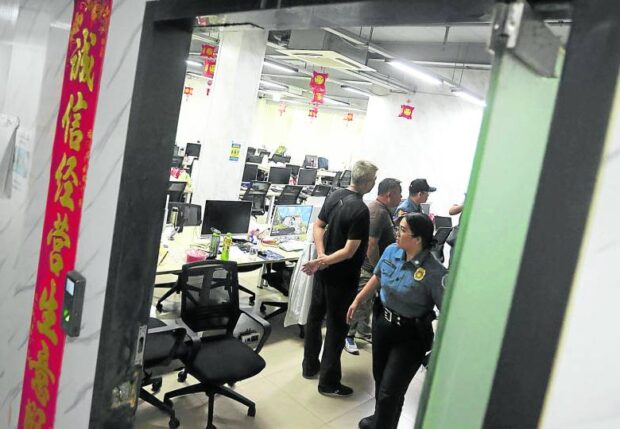
SERVING WARRANTS Police units continue to serve five warrants to search, seize and examine data and two search warrants issued by a court against Philippine offshore gaming operator (Pogo) service provider Xinchuang Network Technology Inc. in Las Pinas City. —MARIANNE BERMUDEZ
The Philippine National Police Anti-Cybercrime Group (PNP-ACG) said on Thursday it would ask the Philippine Amusement and Gaming Corp. (Pagcor) to include the PNP in its inspections of Philippine offshore gaming operators (Pogos) in the country amid their recent involvement in criminal activities.
“First of all, we want the participation of the PNP. We should be active in the conduct of inspections so that we can immediately see if there are any problems within Pogos. Right now we are not doing this; the PNP is not included,” ACG Director Brig. Gen. Sidney Hernia said at a press briefing in Camp Crame, Quezon City.
“Hopefully, we can institutionalize the presence of the PNP, especially the ACG here, in monitoring the inspections that Pagcor will do,” he added.
According to Hernia, the joint inspection would help authorities maintain peace and order in Pogo firms and their immediate communities.
Policy involvement
“These policy changes would help so we would no longer depend on numerous police operations, where raids come one after another. There were many people who were affected. Most likely, it would be better if they involved us at the policy level,” the PNP official said.
The proposal came after the PNP expressed alarm that seven fugitives were among the more than 2,700 workers who were rescued during the June 27 raid at Xinchuang Network Technology Inc. (formerly Hong Tai), a licensed Pogo service provider, in Las Piñas City last month, for violation of antitrafficking and cybercrime laws.
Pagcor issued a cease-and-desist order against Xinchuang on July 2, pending the completion of the investigation being conducted by the PNP.
Five Chinese nationals who were suspected of being maintainers of the Pogo firm were arrested, but they were ordered released by prosecutors for further investigation.
The Department of Justice and lawmakers criticized the PNP for bungling its operation, saying it did not coordinate its actions with proper authorities, particularly the Inter-Agency Council Against Trafficking.
But the PNP maintained that the raid was done by the book, with proper coordination and case buildup before implementing the two search warrants and five warrants to search and seize computer data issued by the Las Piñas Regional Trial Court.
RELATED STORY:
PNP explains: Proper legal process followed in Las Piñas Pogo raid